感恩节小学英语版
- 格式:ppt
- 大小:1.97 MB
- 文档页数:13
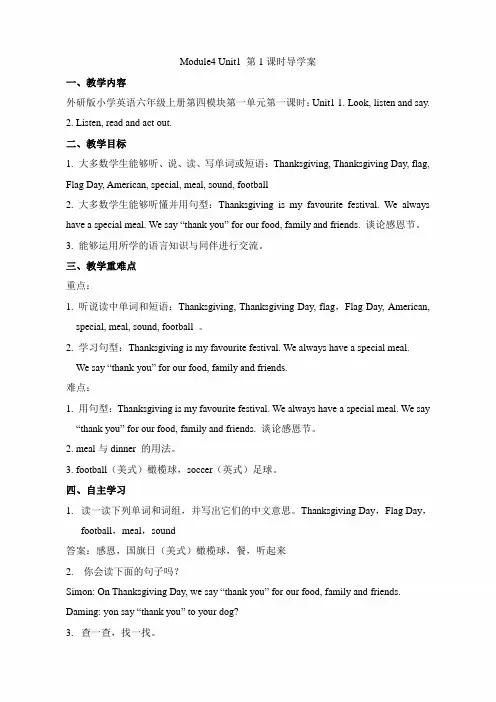
Module4 Unit1 第1课时导学案一、教学内容外研版小学英语六年级上册第四模块第一单元第一课时:Unit1 1. Look, listen and say.2. Listen, read and act out.二、教学目标1. 大多数学生能够听、说、读、写单词或短语:Thanksgiving, Thanksgiving Day, flag, Flag Day, American, special, meal, sound, football2. 大多数学生能够听懂并用句型:Thanksgiving is my favourite festival. We always have a special meal. We say “thank you” for our food, family and friends. 谈论感恩节。
3. 能够运用所学的语言知识与同伴进行交流。
三、教学重难点重点:1. 听说读中单词和短语:Thanksgiving, Thanksgiving Day, flag,Flag Day, American, special, meal, sound, football 。
2. 学习句型:Thanksgiving is my favourite festival. We always have a special meal.We say “thank you” for our food, family and friends.难点:1. 用句型:Thanksgiving is my favourite festival. We always have a special meal. We say “thank you” for our food, family and friends. 谈论感恩节。
2. meal与dinner 的用法。
3. football(美式)橄榄球,soccer(英式)足球。
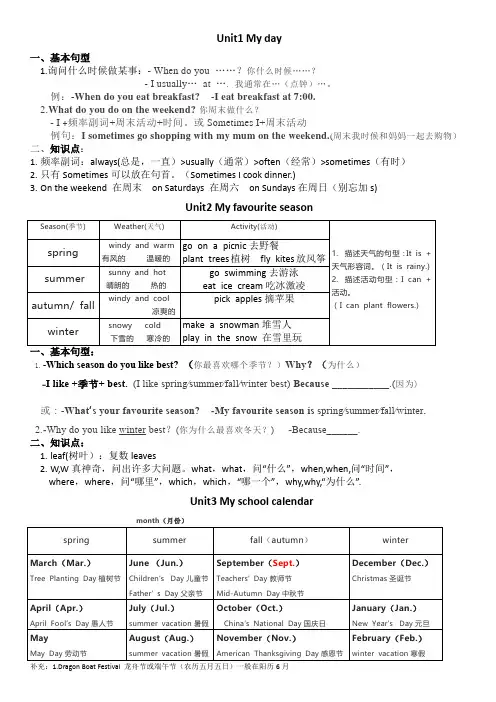
Unit1 My day一、基本句型1.询问什么时候做某事:- When do you ……?你什么时候……?- I usually…at …. 我通常在…(点钟)…。
例:-When do you eat breakfast?-I eat breakfast at 7:00.2.What do you do on the weekend?你周末做什么?- I +频率副词+周末活动+时间。
或Sometimes I+周末活动例句:I sometimes go shopping with my mum on the weekend.(周末我时候和妈妈一起去购物)二、知识点:1.频率副词:always(总是,一直)>usually(通常)>often(经常)>sometimes(有时)2.只有Sometimes可以放在句首。
(Sometimes I cook dinner.)3.On the weekend 在周末on Saturdays 在周六on Sundays在周日(别忘加s)Unit2 My favourite season1.-Which season do you like best? (你最喜欢哪个季节?)Why?(为什么)-I like +季节+ best.(I like spring∕summer∕fall∕winter best) Because ___________.(因为)或:-What‘s your favourite season? -My favourite season is spring∕summer∕fall∕winter.2.-Why do you like winter best?(你为什么最喜欢冬天?) -Because______.二、知识点:1.leaf(树叶):复数leaves2.W,W真神奇,问出许多大问题。
what,what,问“什么”,when,when,问“时间”,where,where,问“哪里”,which,which,“哪一个”,why,why,“为什么”.Unit3 My school calendar补充:1.Dragon Boat Festival 龙舟节或端午节(农历五月五日)一般在阳历6月2.月份首字母大写。
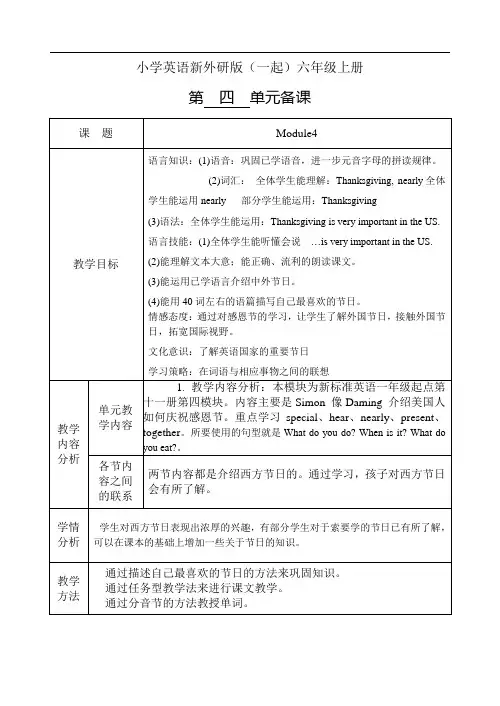
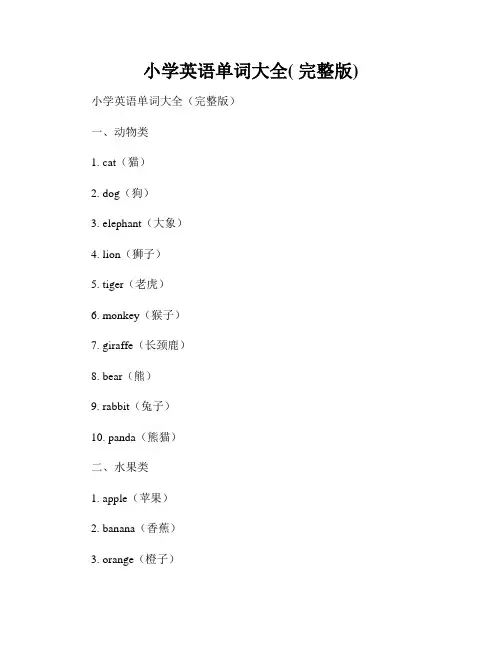
小学英语单词大全( 完整版)小学英语单词大全(完整版)一、动物类1. cat(猫)2. dog(狗)3. elephant(大象)4. lion(狮子)5. tiger(老虎)6. monkey(猴子)7. giraffe(长颈鹿)8. bear(熊)9. rabbit(兔子)10. panda(熊猫)二、水果类1. apple(苹果)2. banana(香蕉)3. orange(橙子)4. strawberry(草莓)5. cherry(樱桃)6. blueberry(蓝莓)7. watermelon(西瓜)8. pineapple(菠萝)9. grape(葡萄)10. peach(桃子)三、颜色类1. red(红色)2. blue(蓝色)3. yellow(黄色)4. green(绿色)5. orange(橙色)6. purple(紫色)7. pink(粉色)8. brown(棕色)9. black(黑色)四、家庭类1. father(父亲)2. mother(母亲)3. brother(兄弟)4. sister(姐妹)5. grandfather(爷爷)6. grandmother(奶奶)7. uncle(叔叔)8. aunt(阿姨)9. cousin(表兄妹)10. family(家庭)五、食物类1. rice(米饭)2. bread(面包)3. noodles(面条)4. egg(鸡蛋)6. juice(果汁)7. hamburger(汉堡包)8. pizza(比萨饼)9. sandwich(三明治)10. soup(汤)六、学校类1. school(学校)2. classroom(教室)3. teacher(老师)4. student(学生)5. desk(桌子)6. chair(椅子)7. book(书)8. pen(笔)9. pencil(铅笔)10. ruler(尺子)七、自然类1. sun(太阳)2. moon(月亮)3. star(星星)4. sky(天空)5. cloud(云)6. rain(雨)7. snow(雪)8. wind(风)9. flower(花)10. tree(树)八、交通工具类1. car(汽车)2. bus(公交车)3. bike(自行车)4. train(火车)5. taxi(出租车)6. airplane(飞机)7. ship(船)8. motorcycle(摩托车)9. subway(地铁)10. boat(小船)九、身体部位类1. head(头)2. eye(眼睛)3. ear(耳朵)4. nose(鼻子)5. mouth(嘴巴)6. hand(手)7. leg(腿)8. foot(脚)9. arm(手臂)10. body(身体)十、节日类1. Christmas(圣诞节)2. Halloween(万圣节)3. Easter(复活节)4. New Year(新年)5. Thanksgiving(感恩节)6. Valentine's Day(情人节)7. Birthday(生日)8. Independence Day(国庆日)9. Spring Festival(春节)10. Mid-Autumn Festival(中秋节)十一、数字类1. one(一)2. two(二)3. three(三)4. four(四)5. five(五)6. six(六)7. seven(七)8. eight(八)9. nine(九)10. ten(十)以上是小学英语单词大全的完整版,包括了动物、水果、颜色、家庭、食物、学校、自然、交通工具、身体部位、节日和数字等各个方面的单词。
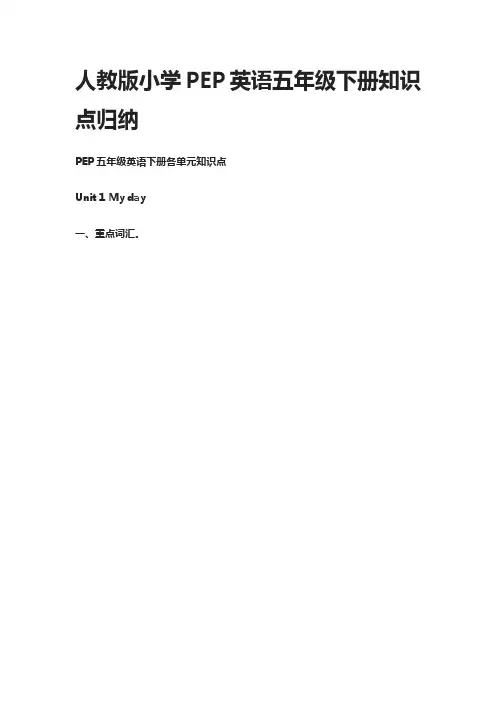
人教版小学PEP英语五年级下册知识点归纳PEP五年级英语下册各单元知识点Unit 1 My day一、重点词汇。
五、重点句型。
1、询问别人什么时候做某事的句型及回答。
句型结构:问:When do you+动词短语原形+其他?(你/你们什么时候做某事?)答:I/We(+频度副词)+动词短语原形+at+具体时间(我/我们通常在几点做某事。
)例:问:When do you go to bed?(你什么时候上床睡觉?)答:I go to bed at 9:00p.m (我晚上9点上床睡觉。
)注意:当主语是第三人称单数(he,she,it,单个人名或单数名词)时,助动词do 要变成does,句型结构是:When does+主语(第三人称单数)+动词短语原形+其他?2、询问别人周末做什么的句型及回答。
句型结构:问:What do you do on theweekend?(你周末做什么?)答:I(+频度副词)+动词(短语)+其他。
例:问:What do you do on theweekend?(你周末做什么?)答:I usually read books. (我通常看书。
)注意:当主语是第三人称单数(he,she,it,单个人名或单数名词)时,助动词do 要变成does,句型结构是:What does+主语(第三人称单数)+do+on the weekend?六、四会句子:When do you finish class in the morning ? 你们上午的课到几点结束?We finish class at 1 o’clock . 我们一点钟结束上午的课。
What do you do on the weekend ? 你周末做什么?I often watch TV and play ping-pong with my father . 我经常看电视,也常和我爸爸一起打乒乓球。
七、语音:cl /kl/ clean clock class cleverpl /pl / plate eggplant please play Unit 2 My favourite season三、重点句型1、询问别人天气怎么样的句型及回答。
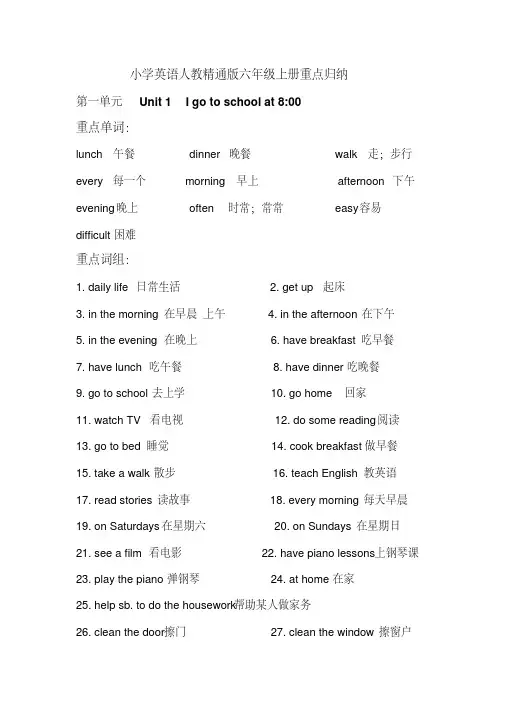
小学英语人教精通版六年级上册重点归纳第一单元Unit 1 I go to school at 8:00重点单词:lunch 午餐dinner 晚餐walk 走;步行every 每一个morning 早上afternoon 下午evening 晚上often 时常;常常easy 容易difficult困难重点词组:1. daily life 日常生活2. get up 起床3. in the morning 在早晨上午4. in the afternoon 在下午5. in the evening 在晚上6. have breakfast 吃早餐7. have lunch 吃午餐8. have dinner 吃晚餐9. go to school 去上学10. go home 回家11. watch TV 看电视12. do some reading 阅读13. go to bed 睡觉14. cook breakfast 做早餐15. take a walk 散步16. teach English 教英语17. read stories 读故事18. every morning 每天早晨19. on Saturdays 在星期六20. on Sundays 在星期日21. see a film 看电影22. have piano lessons 上钢琴课23. play the piano 弹钢琴24. at home 在家25. help sb. to do the housework 帮助某人做家务26. clean the door 擦门27. clean the window 擦窗户28. clean the floor 擦地板重点句型:have breakfast at 7:00 in the morning . 我不是在早上七点钟吃1.I don’t早餐。
2.She gets up at 6:00 in the morning . 她在早上六点钟起床。
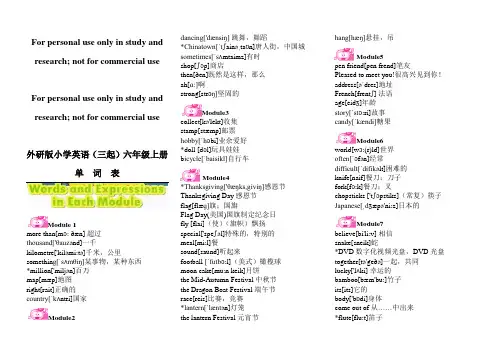
For personal use only in study and research; not for commercial useFor personal use only in study and research; not for commercial use外研版小学英语(三起)六年级上册单词表Module 1more than[mɔ: ðæn] 超过thousand['θauzənd]一千kilometre['kiləmi:tə]千米,公里somethin g[ˈsʌmθiŋ]某事物,某种东西*million['miljən]百万map[mæp]地图right[rait]正确的country[ˈkʌntri]国家Module2 dancing['dænsiŋ]跳舞,舞蹈*Chinatown[ˈtʃainəˌtaʊn]唐人街,中国城sometimes[ˈsʌmtaimz]有时shop[ʃɔp]商店then[ðen]既然是这样,那么ah[ɑ:]啊strong[strɔŋ]坚固的Module3collect[kə'lekt]收集stamp[stæmp]邮票hobby[ˈhɔbi]业余爱好*doll [dɔl]玩具娃娃b icycle[ˈbaisikl]自行车Module4*Thanksgiving['θæŋks,giviŋ]感恩节Thanksgiving Day感恩节flag[flæɡ]旗;国旗Flag Day(美国)国旗制定纪念日fly [flai](使)(旗帜)飘扬special['speʃəl]特殊的,特别的meal[mi:l]餐sound[saund]听起来football [ˈfutbɔ:l](美式)橄榄球moon cake[mu:n keik]月饼the Mid-Autumn Festival中秋节the Dragon Boat Festival端午节race[reis]比赛,竞赛*lantern[ˈlæntən]灯笼the lantern Festival元宵节hang[hæŋ]悬挂,吊Module5pen friend[pen frend]笔友Pleased to meet you!很高兴见到你!address[əˈdres]地址French[frentʃ] 法语age[eidʒ]年龄story[ˈstɔ:ri]故事candy[ˈkændi]糖果Module6world[wɜ:(r)ld]世界often[ˈɔfən]经常difficult[ˈdifikəlt]困难的knife[naif]餐刀;刀子fork[fɔ:k]餐刀;叉chopsticks ['tʃɔpstiks](常复)筷子Japanese[ˌdʒæpə'ni:z]日本的Module7believe[bi'li:v] 相信snake[sneik]蛇*DVD数字化视频光盘,DVD光盘together[tə'geðə]一起,共同lucky['lʌki] 幸运的bamboo[bæm'bu:]竹子its[its]它的body['bɒdi]身体come out of从……中出来*flute[flu:t]笛子get[get]变得,变成frightened['fraitnd]恐惧的,害怕的Module8long ago 很久以前 I’d love to 我很乐意not really 不全是,事实上没有 stop (使)停止 clean[kli:n]打扫,(使)清洁 camera['kæm(ə)r ə]照相机show[ʃəʊ] 把……给(某人)看 never['nev ə]从不Module9around[ə'ra ʊnd] 在四周,到处 all around 到处,遍及 member state 成员国inside[in'said]向室内,向里面 should[ʃʊd]应该Module10line [lain] (等候的)长队,队列 stand in line 排队close[kl əʊs]关门,关闭librarian[lai'bre əri ən]图书馆管理员 rule[ru:l]规定,规章 quiet['kwai ət]安静的problem['pr ɔbl əm] 麻烦,困难,问题 No problem 没问题cross[kr ɔs] 穿过(马路等);渡过(河)仅供个人用于学习、研究;不得用于商业用途。
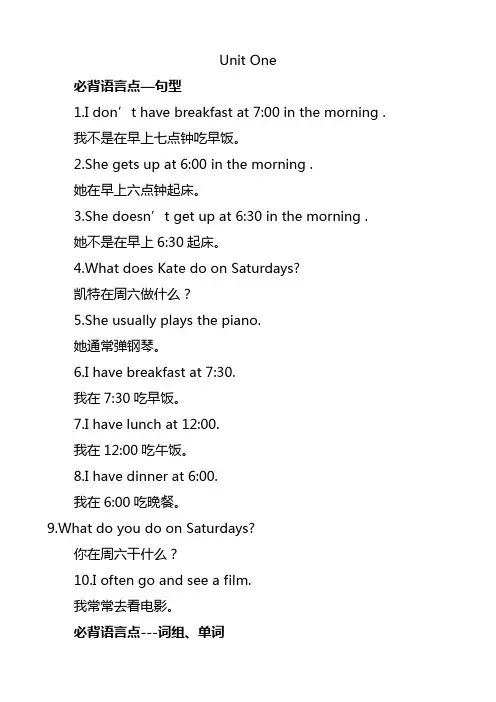
Unit One必背语言点—句型1.I don’t have breakfast at 7:00 in the morning .我不是在早上七点钟吃早饭。
2.She gets up at 6:00 in the morning .她在早上六点钟起床。
3.She doesn’t get up at 6:30 in the morning .她不是在早上6:30起床。
4.What does Kate do on Saturdays?凯特在周六做什么?5.She usually plays the piano.她通常弹钢琴。
6.I have breakfast at 7:30.我在7:30吃早饭。
7.I have lunch at 12:00.我在12:00吃午饭。
8.I have dinner at 6:00.我在6:00吃晚餐。
9.What do you do on Saturdays?你在周六干什么?10.I often go and see a film.我常常去看电影。
必背语言点---词组、单词1.get up 起床2.go to school 上学3.School begins.上课。
4.School is over. 下学。
5.go home 回家6.watch TV看电视7.go to bed 睡觉8.cook breakfast 做早饭9.teach English 教英语10.take a walk 散步11.read stories读故事12play the piano 弹钢琴13.have breakfast吃早饭14.lunch 午饭15.dinner 晚餐16.walk 步行17.every 每一18.morning 早上,上午19.afternoon 下午20.evening晚上21.often 常常22.see a film 看电影23.clean the window/door/floor 擦窗户/门/地板24.easy 容易的25.difficult 困难的Unit Two必背语言点—句型1.What’s your grandpa’s hobby?你爷爷的爱好是什么?2.His hobby is fishing .他的爱好是钓鱼。
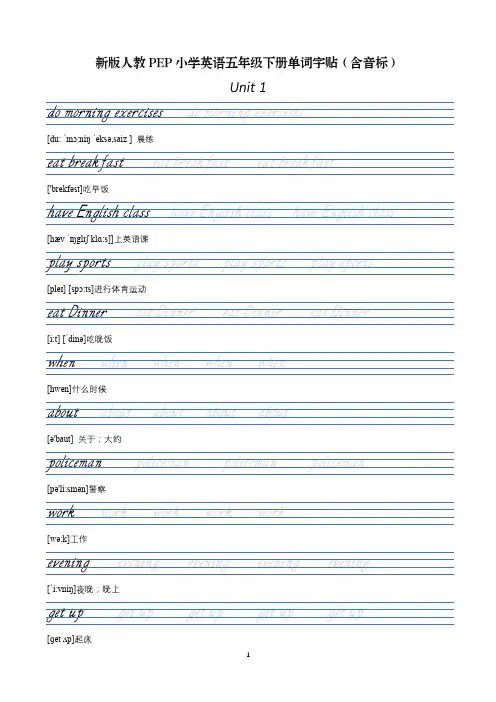
新版人教PEP小学英语五年级下册单词字贴(含音标)Unit1do morning exercises do morning exercises[du:ˈmɔ:niŋˈeksə,saiz]晨练eat breakfast eat breakfast eat breakfast['brekfəst]吃早饭have English class have English class have English class [hævˈɪŋglɪʃklɑ:s]]上英语课play sports play sports play sports play sports [pleɪ][spɔ:ts]进行体育运动eat Dinner eat Dinner eat Dinner eat Dinner[i:t][ˈdinə]吃晚饭when when when when when[hwen]什么时候about about about about about[ə'baut]关于;大约policeman policeman policeman policeman[pə'li:smən]警察work work work work work[wə:k]工作evening evening evening evening evening[ˈi:vniŋ]夜晚;晚上get up get up get up get up get up[ɡetʌp]起床1at at at at at[æt,ət]在……点钟usually usually usually usually usually[ˈjuːʒuəli]通常;一般noon noon noon noon noon[nu:n]中午tell tell tell tell tell[tel]告诉;说climb mountains climb mountains climb mountains [klaim][ˈmauntinz]爬山go shopping go shopping go shopping[ɡəuˈʃɔpɪŋ]购物;买东西play the piano play the piano play the piano[pleiðəpiˈænəu]弹钢琴visit grandparents visit grandparents visit grandparents ['vizit]['ɡrænd,pεərənts]看望(外)祖父母go hiking go hiking go hiking go hiking[ɡəu][haiking]去远足weekend weekend weekend weekend[,wi:k'end,'wi:kend]周末often often often often often['ɔfən,'ɔftən,'ɔ:-]经常sometimes sometimes sometimes sometimes['sʌmtaimz]有时候2rain rain rain rain rain[rein]下雨either either either either either['aiðə,'i:-]也next next next next next[nekst]下一个Unit2spring spring spring spring spring [spriŋ]春天summer summer summer summer summer ['sʌmə]夏天fall fall fall fall fall[fɔ:l]秋天winter winter winter winter winter ['wintə]冬天season season season season season['si:zən](季节which which which which which[hwitʃ]哪一个best best best best best[best]最;极always always always always always ['ɔ:lweiz,-wiz]总是3play with play with play with play with[plei wið]玩…snow snow snow snow snow[snəu]雪leaf复数leaves leaves leaves leaves leaves[li:f][li:vz]叶子up up up up up[ʌp]至;朝向north north north north north[nɔ:θ]北方;向北方Halloween Halloween Halloween Halloween[ˈhæləʊˈi:n]万圣节之前夕Thanksgiving Thanksgiving Thanksgiving Thanksgiving [θæŋksˈgɪvɪŋ]感恩节swim swim swim swim swim[swim]游泳fly kites fly kites fly kites fly kites fly kites[flai][kaits]放风筝skate skate skate skate skate[skeit]滑冰;滑冰鞋make a snowman make a snowman make a snowman[meikəˈsnəʊˈmæn]堆雪人plant trees plant trees plant trees plant trees[plɑ:nt,plænt][tri:z]种树4why why why why why[hwaɪ,waɪ]为什么because because because because because[bɪˈkɔz,-ˈkʌz]因为sleep sleep sleep sleep sleep[sli:p]睡觉Unit3Jan./January January January January January[美][ˈdʒænjuˈɛri]一月Feb./February February February February [英][ˈfebruəri]二月Mar./March March March March March [mɑ:tʃ]三月Apr./April April April April April['eiprəl]四月May May May May May[mei]五月June June June June June[dʒu:n]六月July July July July July[dʒʊˈlaɪ]七月Aug./August August August August August[ɔ:ˈɡʌst]八月5Sept./September September September September [sep'tembə]九月Oct./October October October October October [ɔk'təubə]十月Nov./November November November November[nəu'vembə]十一月Dec./December December December December[di'sembə]十二月chart chart chart chart chart[英][tʃɑ:t][美][tʃɑrt]图表birthday birthday birthday birthday birthday ['bə:θdei]生日Uncle Uncle Uncle Uncle Uncle['ʌŋkl]叔叔;舅舅cousin cousin cousin cousin cousin['kʌzn]堂表兄弟;堂表姐妹first first first first first[fə:st]第一second second second second second['sekənd]第二third third third third third[θə:d]第三forth forth forth forth forth[英][fɔ:θ][美][fɔrθ,forθ]第四6fifth fifth fifth fifth fifth[fifθ]第五eighth eighth eighth eighth eighth[eitθ,eiθ]第八ninth ninth ninth ninth ninth[nainθ]第九twelfth twelfth twelfth twelfth twelfth [twelfθ]第十二twentieth twentieth twentieth twentieth['twentiiθ]第二十send send send send send[send]寄;发送e-card e-card e-card e-card e-card [i:][英][kɑ:d][美][kɑrd电子卡片her her her her her[hə:]她的able able able able able[ˈeibl]能everybody everybody everybody everybody [ˈevribɔdi]每个人then then then then then[ðen]那么date date date date date[deit]日期7Unit4draw pictures draw pictures draw pictures draw pictures [drɔ:]['piktʃəz]画画cook dinner cook dinner cook dinner cook dinner[kuk]['dinə]做饭read a book read a book read a book read a book[ri:dəbuk]看书answer the phone answer the phone answer the phone['ɑ:nsə,'æn-][fəun]接电话talk talk talk talk talk[tɔ:k]讲话Children’s Children’s Children’s Children’s[ˈtʃɪldrənz]Center[ˈsentə]儿童活动中心see you later see you later see you later see you later [si:][ju:,ju,jə][ˈleitə]再见listen to music listen to music listen to music['lisən]['mju:zik]听音乐clean the room clean the room clean the room[kli:n][ru:m,rum]打扫房间writea letter writea letter writea letter writea letter[rait]['letə]写信write an e-mail write an e-mail write an e-mail[ˈi:meil]写电子邮件8mom mom mom mom mom[英][mɔm][美][mɑm]妈妈grandpa grandpa grandpa grandpa grandpa ['ɡrændpɑ:]爷爷;外公speak to speak to speak to speak to speak to [spi:k][tu:,tu,tə]和…讲话hold on hold on hold on hold on hold on [həuldɔn]等一下call call call call call[kɔ:l]打电话study study study study study['stʌdi]书房Unit5fly fly fly fly fly[flai]飞jump jump jump jump jump[dʒʌmp]跳walk walk walk walk walk[wɔ:k]走run run run run run[rʌn]跑swim swim swim swim swim[swim]游泳9kangaroo kangaroo kangaroo kangaroo[ˈkæŋgəˈru:]袋鼠trunk trunk trunk trunk trunk[trʌŋk]象鼻sleep sleep sleep sleep sleep[sli:p]睡觉climb climb climb climb climb[klaim]往上爬fight fight fight fight fight[fait]打架swing swing swing swing swing[swiŋ]荡;荡秋千drink water drink water drink water drink water[driŋk]['wɔ:tə,'wɔ-]喝水climber climber climber climber climber['klaimə]攀登者Unit6take pictures take pictures take pictures take pictures [teikˈpiktʃəz]照相watch insects watch insects watch insects watch insects [wɔtʃ,wɔ:tʃ]['insekts]观察昆虫pick up leaves pick up leaves pick up leaves pick up leaves [pik][ʌp][li:vz]采摘树叶10do an experiment do an experiment do an experiment[du:æn iksˈperimənt]做实验catch butterflies catch butterflies catch butterflies[kætʃ]['bʌtəflaiz]捉蝴蝶woods woods woods woods woods[wudz]树木ant ant ant ant ant[ænt]蚂蚁interesting interesting interesting interesting[ˈɪntrɪstɪŋ,ˈɪntrəstɪŋ]有趣的have a look have a look have a look have a look[hævəluk]看一看honey honey honey honey honey['hʌni]蜂蜜thing thing thing thing thing[θiŋ]东西;物count insects count insects count insects count insects [kaunt]['insekts]数昆虫collect leaves collect leaves collect leaves collect leaves[kə'lekt][li:vz]收集树叶write write write write write[rait]a report[ri'pɔ:t]写报告play chess play chess play chess play chess[plei tʃes]下棋have a picnic have a picnic have a picnic have a picnic [hævəˈpiknik]举行野餐him him him him him[him,ɪm]他宾格leave leave leave leave leave[li:v]离开us us us us us[ʌs,əs,s]我们宾格over there over there over there over there[ˈəuvəðɛə]在那边。
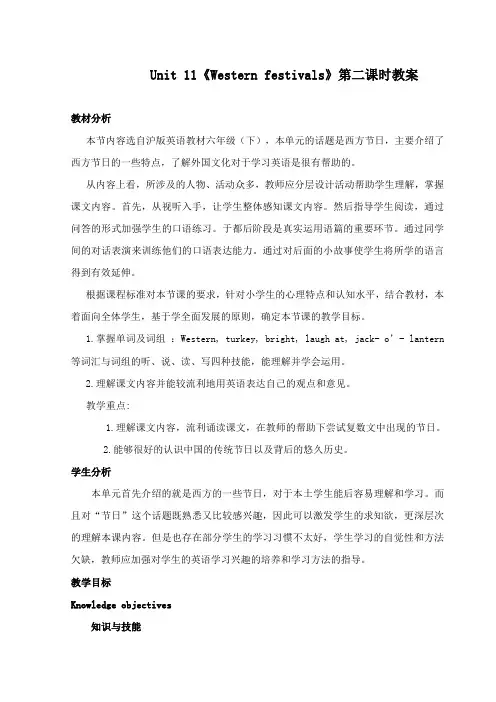
Unit 11《Western festivals》第二课时教案教材分析本节内容选自沪版英语教材六年级(下),本单元的话题是西方节日,主要介绍了西方节日的一些特点,了解外国文化对于学习英语是很有帮助的。
从内容上看,所涉及的人物、活动众多,教师应分层设计活动帮助学生理解,掌握课文内容。
首先,从视听入手,让学生整体感知课文内容。
然后指导学生阅读,通过问答的形式加强学生的口语练习。
于都后阶段是真实运用语篇的重要环节。
通过同学间的对话表演来训练他们的口语表达能力。
通过对后面的小故事使学生将所学的语言得到有效延伸。
根据课程标准对本节课的要求,针对小学生的心理特点和认知水平,结合教材,本着面向全体学生,基于学全面发展的原则,确定本节课的教学目标。
1.掌握单词及词组:Western, turkey, bright, laugh at, jack- o’- lantern 等词汇与词组的听、说、读、写四种技能,能理解并学会运用。
2.理解课文内容并能较流利地用英语表达自己的观点和意见。
教学重点:1.理解课文内容,流利诵读课文,在教师的帮助下尝试复数文中出现的节日。
2.能够很好的认识中国的传统节日以及背后的悠久历史。
学生分析本单元首先介绍的就是西方的一些节日,对于本土学生能后容易理解和学习。
而且对“节日”这个话题既熟悉又比较感兴趣,因此可以激发学生的求知欲,更深层次的理解本课内容。
但是也存在部分学生的学习习惯不太好,学生学习的自觉性和方法欠缺,教师应加强对学生的英语学习兴趣的培养和学习方法的指导。
教学目标Knowledge objectives知识与技能1.掌握单词及词组:Western, turkey, bright, laugh at, jack- o’- lantern 等词汇与词组的听、说、读、写四种技能,能理解并学会运用。
2.理解课文内容并能较流利地用英语表达自己的观点和意见。
过程与方法:做游戏,学生分组进行情境表演,让其他同学猜一猜回顾学过的知识,并且能够应用到下面即将要讲的新课中。
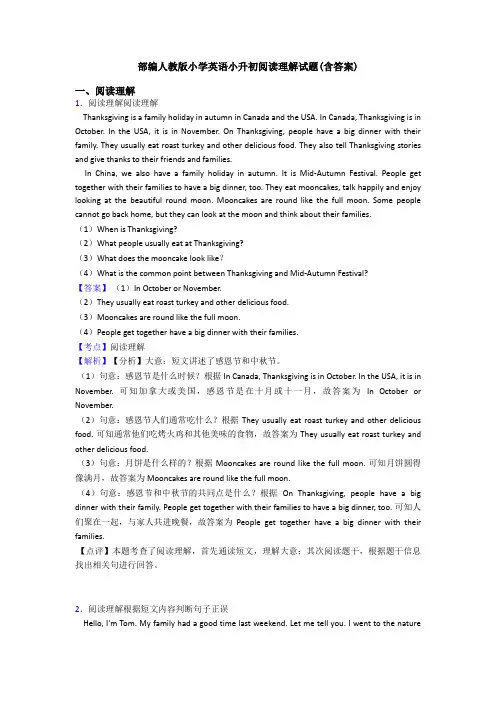
部编人教版小学英语小升初阅读理解试题(含答案)一、阅读理解1.阅读理解阅读理解Thanksgiving is a family holiday in autumn in Canada and the USA. In Canada, Thanksgiving is in October. In the USA, it is in November. On Thanksgiving, people have a big dinner with their family. They usually eat roast turkey and other delicious food. They also tell Thanksgiving stories and give thanks to their friends and families.In China, we also have a family holiday in autumn. It is Mid-Autumn Festival. People get together with their families to have a big dinner, too. They eat mooncakes, talk happily and enjoy looking at the beautiful round moon. Mooncakes are round like the full moon. Some people cannot go back home, but they can look at the moon and think about their families.(1)When is Thanksgiving?(2)What people usually eat at Thanksgiving?(3)What does the mooncake look like?(4)What is the common point between Thanksgiving and Mid-Autumn Festival?【答案】(1)In October or November.(2)They usually eat roast turkey and other delicious food.(3)Mooncakes are round like the full moon.(4)People get together have a big dinner with their families.【考点】阅读理解【解析】【分析】大意:短文讲述了感恩节和中秋节。
人教版小学PEP英语五年级下册知识点归纳PEP五年级英语下册各单元知识点Unit 1 My day一、重点词汇。
1.四会词汇:eat breakfast 吃早饭 have···class 上······课play sports 进行体育运动exercise 活动;运动 domorning exercises做早操eat dinner吃晚饭clean my room 打扫我的房间go shopping 去买东西;购物go for a walk 散步take学习;上(课) dancing跳舞;舞蹈 take a dancing class 上舞蹈课2. 三会词汇:when什么时候after 在(时间)后start 开始usually 通常地;惯常地Spain 西班牙late 晚;迟 a.m. 午前;上午 p.m. 午后;下午why 为什么shop 去买东西;购物work 工作last 上一个的;刚过去的sound 听起来好像also 还;也busy 忙的 need 需要play 戏剧;剧本letter 信live 居住island 岛always 总是;一直cave 山洞;洞穴go swimming 去游泳 win 获胜二、其他日常活动。
get up起床 eat lunch吃午饭 go to bed 上床睡觉wash my face洗脸 wash my clothes 洗我的衣服 watch TV看电视play ping-pong打乒乓球 playthe pipa弹琵琶 go swimming去游泳go running去跑步 do homework 做作业 do kung fu练武术play football踢足球 play basketball打篮球三、频度副词。
always总是,一直(100%) usually通常(80%)often 经常(60%) sometimes(30%)有时四、疑问词。
【课内词汇背背背】人教版(三起) 小学英语五年级(上册+下册) 词汇表(pdf版)课内词汇背背背sunglasses []n.太阳镜pretty []adj.美观的;精致的expensive []adj.费钱的;昂贵的cheap []adj.便宜的nice []adj.好的try on 试穿size []n.尺码;号of course []当然too []adv.太;过于just []adv.正好;恰好how much 多少钱eighty []num.八十dollar []n.元sale []n.特价销售;降价more []adj.更多的us []pron.我们五年级·上21old []adj.老的young []adj.年轻的polite []adj.有礼貌的;客气的funny []adj.滑稽的;可笑的strong []adj.强壮的kind []adj.体贴的hard-working []adj.工作辛苦的;辛勤的helpful []adj.愿意帮忙的clever []adj.聪明的shy []adj.羞怯的know []v.知道;了解our []pron.我们的Ms []n.女士will []modal v.将要22 人教版小学英语(三起)词汇表课内词汇背背背sometimes []adv.有时;间或robot []n.机器人him []pron.他speak []v.会讲;会说finish []v.完成;做好Monday []n.星期一Tuesday []n.星期二Wednesday []n.星期三Thursday []n.星期四Friday []n.星期五wash my clothes 洗我的衣服read books 看书play football 踢足球play sports 做体育运动weekday []n.周末23wash []v.洗watch []v.看do homework 做作业Saturday []n.星期六Sunday []n.星期天often []adv.常常;经常do []v.做;干read []v.读;看play []v.踢;玩;参加cooking []n.烹饪;烹调park []n.公园do housework 做家务day []n.天tired []adj.疲倦的watch TV 看电视read books 读书sport []n.体育运动24 人教版小学英语(三起)词汇表课内词汇背背背should []modal v.应该;应当every []adj.每一个;每个schedule []n.工作计划;日程安排Unit 3sandwich []n.三明治salad []n.蔬菜沙拉hamburger []n.汉堡包ice cream []n.冰激凌tea []n.茶;茶水delicious []adj.美味的;可口的hot []adj.辣的;辛辣的sweet []adj.含糖的;甜的drink []v.喝;饮thirsty []adj.渴的;口渴的food []n.食物25Dear []adj.亲爱的healthy []adj.健康的;有益健康的fresh []adj.新鲜的favourite []adj.特别喜欢的Unit 4sing []v.唱;唱歌song []n.歌曲sing English songs 唱英文歌曲play the pipa 弹琵琶kung fu []n.功夫;武术do kung fu 练武术dance []v.跳舞draw []v.画cartoon []n.漫画draw cartoons 画漫画cook []v.烹饪;烹调26 人教版小学英语(三起)词汇表课内词汇背背背swim []v.游泳play basketball 打篮球Ping-pong []n.乒乓球play ping-pong 打乒乓球speak English 说英语party []n.聚会;派对next []adj.下一个的wonderful []adj.极好的;了不起的learn []v.学;学习;学会any []pron.任何的;任一的problem []n.问题no problem 没问题want []v.要;想要send []v.邮寄;发送email []n.电子邮件at []prep.(后面接邮件地址)27Unit 5clock []n.时钟plant []n.植物bottle []n.瓶子bike []n.自行车photo []n.照片front []n.正面between []prep.在…中间above []prep.在…上面beside []prep.在旁边behind []prep.在…后面there []adv.(表示存在或发生)grandparent []n.祖父pron.他们的;她们的;它们their []的house []n.房子28 人教版小学英语(三起)词汇表课内词汇背背背lot []n.大量;许多lots of 大量;许多flower []n.花朵move []v.搬家dirty []adj.肮脏的everywhere []adv.处处;到处mouse []n.老鼠forest []n.森林river []n.河流lake []n.湖;湖泊hill []n.山丘;小山mountain []n.山;山脉tree []n.树nature []n.自然界village []n.乡村;村庄29bridge []n.桥go boating 去划船park []n.公园nature park 自然公园high []adj.高的house []n.房屋building []n.建筑物五年级·下Unit 1do morning exercises 晨练eat breakfast 吃早饭get up 起床have English class 上英语课play sports 进行体育运动eat dinner 吃晚饭when []adv.什么时候about []prep.关于;大约30 人教版小学英语(三起)词汇表课内词汇背背背policeman []n.警察work []n.工作evening []n.夜晚;晚上at []prep.在…点钟often []adv.经常usually []adv.通常;一般tell []v.告诉;说noon []n.中午climb mountains 爬山go shopping 购物;买东西play the piano 弹钢琴go hiking 去远足visit grandparents 看望祖父母weekend []n.周末sometimes []adv.有时rain []v.下雨31either []adv.也next []adj.下一个Unit 2spring []n.春天fall []n.秋天summer []n.夏天winter []n.冬天season []n.季节fly kites 放风筝which []adv.哪一个best []adj.最;极always []adv.总是play with 玩…snow []n.雪leaf []n.叶子up []adv.至北方或北方城市32 人教版小学英语(三起)词汇表课内词汇背背背north []n.&adv.北方;向北方Halloween []n.万圣节前夕Thanksgiving []n.感恩节swim []v.游泳skate []n.滑冰;滑冰鞋make a snowman 堆雪人plant trees 种树why []adv.为什么sleep []v.睡觉because []conj.因为Unit 3January []n.一月February []n.二月March []n.三月April []n.四月33May []n.五月June []n.六月July []n.七月August []n.八月September []n.九月October []n.十月November []n.十一月December []n.十二月birthday []n.生日uncle []n.叔叔;舅舅cousin []n.堂兄弟;表姐妹first []num.第一second []num.第二third []num.第三fourth []num.第四fifth []num.第五34 人教版小学英语(三起)词汇表课内词汇背背背eighth []num.第八ninth []num.第九twelfth []num.第十二twentieth []num.第二十Unit 4draw pictures 画画cook dinner 做饭read a book 看书listen to music 听音乐answer the phone 接电话talk []v.讲话Children’s Center 儿童活动中心see you later 再见listen to music 听音乐clean the room 打扫房间write a letter 写信35write an e mail 写电子邮件mom []n.妈妈grandpa []n.爷爷;外公speak to 和…讲话hold on 等一下;停住call []v.打电话study []n.书房Unit 5fly []v.飞jump []v.跳run []v.跑swim []v.游泳kangaroo []n.袋鼠trunk []n.象鼻sleep []v.睡觉walk []v.走climb []v.往上爬36 人教版小学英语(三起)词汇表课内词汇背背背fight []v.打架swing []v.荡;荡秋千drink water 喝水climber []n.攀登者Unit 6take pictures 照相watch insects 观察昆虫pick up leaves 采摘树叶do an experiment 做实验catch butterflies 捉蝴蝶woods []n.树林ant []n.蚂蚁interesting []adj.有趣的have a look 看一看collect leaves 收集树叶honey []n.蜂蜜37thing []n.东西;物count insects 数昆虫write a report 写报告play chess 下棋have a picnic 举行野餐him []pron.他leave []v.离开us []pron.我们over there 在那边六年级·上Unit 1science []n.科学museum []n.博物馆post office 邮局cinema []n.电影院bookstore []n.书店38 人教版小学英语(三起)词汇表。
Unit Three 第三单元My school calendar 学校日程When is the summer vacation? 暑假是什么时候?It's in July and August. 暑假在七月和八月。
When is Tree Planting Day? 植树节在什么时候?It's in March. 在三月。
When is Dragon Boat Festival? 端午节在什么时候?It's usually in June. 通常在六月。
My mum will make zongzi then. 那时候,我妈妈会包粽子。
I hope you can come and share some with us. 我希望你能来,和我们一起分享。
That's very kind of you. 你太好了。
When is the school trip this year? 今年的学校出游在什么时候?It's in May. 在五月。
Is the singing contest in May, too? 唱歌比赛也在五月吗?Yes. 是的。
Hooray for May! 好哇五月(为五月喝彩)!---------------------A Let's try 试一试Who will go to the sports meet next week? 下周谁要去运动会?Listen and tick. 听,并打勾。
What's that, Zhang Peng? 张鹏,那是什么?........(完整文字内容,请下载课件后,鼠标划选择复制:/s/blog_96caa2d30102vcuw.html)---------------------Let's talk 谈话Mike: We have a few fun things in spring. 春天我们有几件好玩的事情。
⼈教版⼩学PEP英语五六年级下册知识点归纳Unit 1 My day⼀、重点词汇。
五、重点句型。
1、询问别⼈什么时候做某事的句型及回答。
句型结构:问:When do you+动词短语原形+其他?(你/你们什么时候做某事?)答:I/We(+频度副词)+动词短语原形+at+具体时间(我/我们通常在⼏点做某事。
)例:问:When do you go to bed?(你什么时候上床睡觉?)答:I go to bed at 9:00p.m (我晚上9点上床睡觉。
)注意:当主语是第三⼈称单数(he,she,it,单个⼈名或单数名词)时,助动词do要变成does,句型结构是:When does+主语(第三⼈称单数)+动词短语原形+其他?2、询问别⼈周末做什么的句型及回答。
句型结构:问:What do you do on theweekend?(你周末做什么?)答:I(+频度副词)+动词(短语)+其他。
例:问:What do you do on theweekend?(你周末做什么?)答:I usually read books. (我通常看书。
)注意:当主语是第三⼈称单数(he,she,it,单个⼈名或单数名词)时,助动词do要变成does,句型结构是:What does+主语(第三⼈称单数)+do+on the weekend?六、四会句⼦:When do you finish class in the morning ? 你们上午的课到⼏点结束?We finish class at 1 o’clock . 我们⼀点钟结束上午的课。
What do you do on the weekend ? 你周末做什么?I often watch TV and play ping-pong with my father . 我经常看电视,也常和我爸爸⼀起打乒乓球。
七、语⾳:cl /kl/ clean clock class cleverpl /pl / plate eggplant please playUnit 2 My favourite season三、重点句型1、询问别⼈天⽓怎么样的句型及回答。